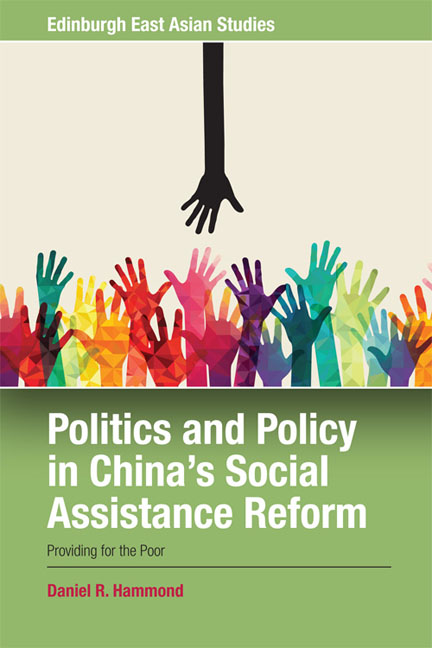Book contents
- Frontmatter
- Contents
- Acknowledgements
- Note on Chinese and Translations
- Glossary of Terms and Abbreviations
- Introduction
- 1 Historical Background to Dibao and the Question of Poverty in China
- 2 Urban Dibao: Emergence and Transition to National Policy, 1992–1999
- 3 Urban Dibao: The Resolution of Unwanted and Unintended Outcomes, 1999–2003
- 4 Rural Dibao: The Countryside and Fragmentation
- 5 Institutionalisation? Achieving Policy in a Fragmented State
- Conclusion
- Appendix: Interview List
- Bibliography
- Index
Conclusion
Published online by Cambridge University Press: 18 December 2019
- Frontmatter
- Contents
- Acknowledgements
- Note on Chinese and Translations
- Glossary of Terms and Abbreviations
- Introduction
- 1 Historical Background to Dibao and the Question of Poverty in China
- 2 Urban Dibao: Emergence and Transition to National Policy, 1992–1999
- 3 Urban Dibao: The Resolution of Unwanted and Unintended Outcomes, 1999–2003
- 4 Rural Dibao: The Countryside and Fragmentation
- 5 Institutionalisation? Achieving Policy in a Fragmented State
- Conclusion
- Appendix: Interview List
- Bibliography
- Index
Summary
Introduction
A point which has been stated and restated at different points during this book has been the remarkable transformation that China has experienced in the almost four decades since the twin policies of reform and opening were implemented. It is almost a cliché nowadays to touch on how much the economy has grown year on year, how villages have been transformed into metropolises, or how historically great cities like Shanghai have re-entered the limelight. The shift from a poor but comparatively equal society, at least in material terms, to one of moderate wealth but greater inequality is a common thread to the narrative of China's transformation. Less frequently told outside of China studies is the story of how China's state-owned sector almost drowned in debt and how the social assistance, social security and social welfare systems all creaked under the contradictions of market reforms and ongoing obligations inherited from the planned economy. The emergence, implementation and subsequent development of dibao is part of this story although it has frequently been passed over to discuss seemingly more pressing concerns, such as China's rapidly ageing population or the difficulties in reforming the delivery of healthcare; and all are dwarfed by the mammoth poverty alleviation projects imposed on the countryside in the last few decades. Fundamentally, the MLG system, in both rural and urban areas, matters as it might not involve the same fiscal resources, nor might it cover as many people, but it tells us a great deal about how the policy process in China works, and day-to- day it affects a similar number of people to those living in the UK.
Goals of the study
While the importance of the dibao programme is now reflected in a growing literature produced by both Chinese and international scholars, the origins and development of the MLG have been treated relatively superficially. This has meant, as noted in the Introduction, that a dominant narrative has emerged regarding dibao which suggests that the system was implemented as a consequence of rational decision making by an omnipotent and benevolent governing system. The documentary and interview evidence suggested very early on when researching this topic that this narrative did not hold up and the reality of the policy process was much messier than subsequently presented or described.
- Type
- Chapter
- Information
- Politics and Policy in China's Social Assistance ReformProviding for the Poor?, pp. 132 - 142Publisher: Edinburgh University PressPrint publication year: 2018



